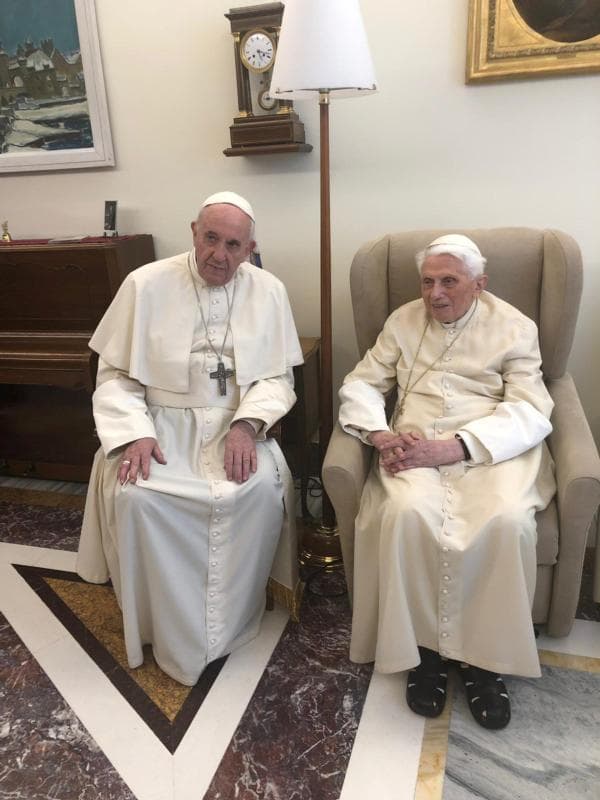After a week of hyperventilating tweets and competing press releases, the position of “pope emeritus” has once again been thrust into the spotlight.
Benedict XVI’s collaboration – let’s use that term – with Cardinal Robert Sarah on a book about the importance of celibacy for the priesthood raised numerous questions about the appropriateness of the former pontiff opining on a question which is currently being considered by his successor, Pope Francis.
RELATED: Benedict is defending celibacy from the media, not from Francis
Several commentators, including many canonists, have called for better rules to be in place to regulate papal retirement.
These calls are not only because of Benedict’s writings, but also due to him using “pope emeritus” as a title, while keeping his regnal name, as opposed to calling himself Joseph Ratzinger; his choice to wear papal white; and his residence in the Vatican.
Each of the decisions has detractors – and defenders, to be sure – but in any event, there is a growing consensus that the process of papal resignation needs to be formalized in Church legislation.
However, that old legal adage comes to mind: “Hard cases make bad laws.”
RELATED: New celibacy kerfuffle sparks debate over role of pope emeritus
Benedict is the first pope to resign in nearly 600 years – Pope Gregory XII gave up the papal throne to end the Western Schism in 1415 – and the first to do so freely since St. Celestine V in 1294.
In other words, it is a classic example of a “black swan”: The very rare but substantial event for which, only in hindsight, everyone thinks they should have been prepared.
When Benedict chose to resign, he had to choose what would happen afterwards.
Some of these choices were made due to his own theological meditations, others were made for more practical reasons.
Living in the Vatican Gardens was probably the most practical – not only does it solve numerous security concerns; it also shields the former pontiff from any outside interference, such as a subpoena from an overzealous prosecutor.
Wearing white? He didn’t really have anything else in the wardrobe.
Keeping the name “Benedict” and the title “pope emeritus”? During his last general audience as pope, Benedict said having been pope, he would always remain within the “enclosure of Saint Peter.” This acknowledged the reality that although he was no longer “the” successor of Peter, he would always be “a” successor of Peter.
RELATED: In tempest over Benedict XVI and book on celibacy, ‘It is as it was’
As an analogy, I can’t help but think of J.R.R. Tolkien and the Lord of the Rings – Once you carried the One Ring of Power, you are always a “ring bearer,” even if you had it for a short time, like Samwise. (One might be reminded of another old adage: All analogies limp, and some of them crawl.)
Yes, in many ways, Benedict and his advisors were winging it in 2013. The Church hadn’t really put a lot of thought into what to do with an ex-pope.
But there were not simple solutions. Can a pope “revert” to cardinal? Popes aren’t “super cardinals.” They leave the college when elected. On a practical level, would anyone want a former pope participating in a conclave, even during the preparatory meetings? Benedict didn’t think so, and hid himself in Castel Gandolfo during the election of his successor.
Should he never speak about Church matters? After all, Benedict said he would be “hidden from the world.” But it was Francis who quashed this plan.
Speaking to the Italian newspaper Corriere della Sera in 2014, Francis said he spoke to Benedict and decided “it would be better if he saw people, that he come out and participate in the life of the Church.”
He compared his predecessor to a grandparent, “who with their wisdom and advice give strength to the family and do not deserve to end in a retirement home.”
Of course, a different retired pope might present different challenges. If a future pontiff were compelled to leave office due to a grave scandal, grandfatherly affections might be lacking.
There is another complicating factor in formalizing the aspects of the “pope emeritus.” In the Church, the pope is the only legislator. Even if there were laws describing in detail what to do with a former pope, a pontiff considering retirement could adjust the legislation any way he saw fit.
This is not to say there are not legitimate questions about whether or not Benedict has lived out his retirement – and let’s face it, when people talk about “a” former pontiff, they mean “the” former pontiff. One would not be surprised if Francis had another discussion with him about the role of the “grandfather” in the family.
But spending time and effort hammering out an official program for the role of “pope emeritus” when it probably won’t be necessary for over a century — or six centuries — and can be thrown out by any pontiff considering retirement?
Some might see it as too much effort to expend just because a 92-year-old man wrote a chapter of a book.
Crux is dedicated to smart, wired and independent reporting on the Vatican and worldwide Catholic Church. That kind of reporting doesn’t come cheap, and we need your support. You can help Crux by giving a small amount monthly, or with a onetime gift. Please remember, Crux is a for-profit organization, so contributions are not tax-deductible.

















